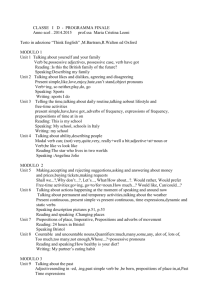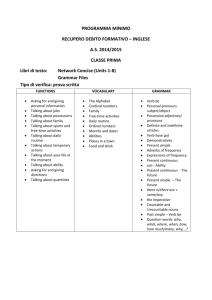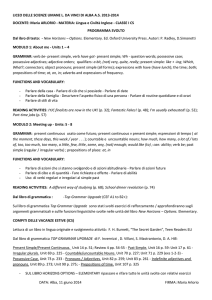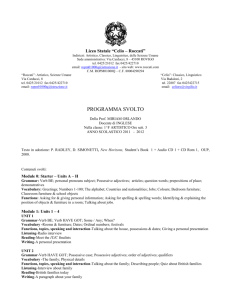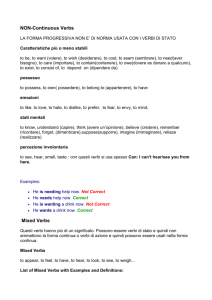IPSSAR “G.Matteotti” – Pisa a.s. 2014/2015 PROGRAMMA DI
advertisement
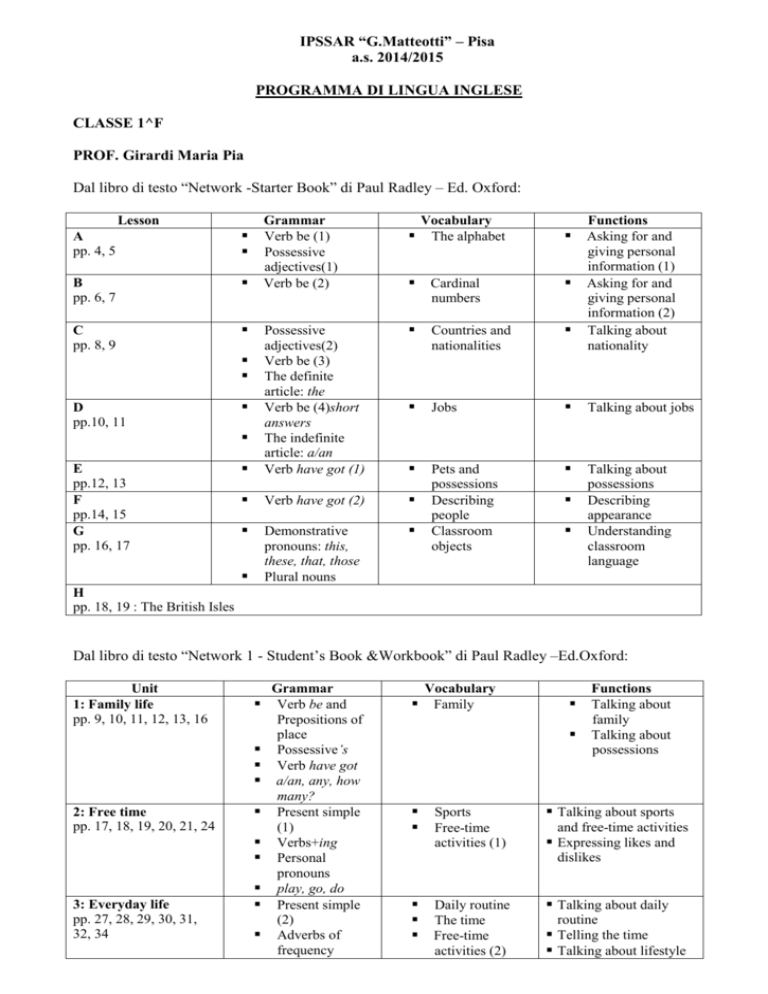
IPSSAR “G.Matteotti” – Pisa a.s. 2014/2015 PROGRAMMA DI LINGUA INGLESE CLASSE 1^F PROF. Girardi Maria Pia Dal libro di testo “Network -Starter Book” di Paul Radley – Ed. Oxford: Lesson A pp. 4, 5 B pp. 6, 7 C pp. 8, 9 Grammar Verb be (1) Possessive adjectives(1) Verb be (2) Cardinal Functions Asking for and giving personal information (1) Asking for and giving personal information (2) Talking about nationality Countries and nationalities Jobs Talking about jobs Possessive adjectives(2) Verb be (3) The definite article: the Verb be (4)short answers The indefinite article: a/an Verb have got (1) Verb have got (2) Demonstrative pronouns: this, these, that, those Plural nouns Pets and possessions Describing people Classroom objects Talking about possessions Describing appearance Understanding classroom language E pp.12, 13 F pp.14, 15 G pp. 16, 17 Vocabulary The alphabet numbers D pp.10, 11 H pp. 18, 19 : The British Isles Dal libro di testo “Network 1 - Student’s Book &Workbook” di Paul Radley –Ed.Oxford: Unit 1: Family life pp. 9, 10, 11, 12, 13, 16 2: Free time pp. 17, 18, 19, 20, 21, 24 3: Everyday life pp. 27, 28, 29, 30, 31, 32, 34 Grammar Verb be and Prepositions of place Possessive’s Verb have got a/an, any, how many? Present simple (1) Verbs+ing Personal pronouns play, go, do Present simple (2) Adverbs of frequency Vocabulary Family Sports Free-time activities (1) Functions Talking about family Talking about possessions Talking about sports and free-time activities Expressing likes and dislikes Daily routine The time Free-time activities (2) Talking about daily routine Telling the time Talking about lifestyle 4: School life pp. 35, 36, 37, 38, 39, 42 5: Difficult days pp. 45, 46, 47, 48, 49, 52 6: In town pp. 53, 54, 55, 56, 57, 60 7: Let’s eat pp. 63, 64, 65, 66, 70 8 :Take a break pagina 72 Prepositions of time at,in,on Expressions with have Present continuous Present simple vs Present continuous Verb can Future : Present simple, Present continuous Prepositions of place There is/there are + some/any The imperative Countable and uncountable nouns some/any, much/many, a lot of/ lots of, little/a little, few/a few, too much/too many, (not) enough Past simple verb be Verb be born School subjects Talking about school Talking about temporary actions Talking about your life Ordinal numbers Months and dates Abilities Places in town at the moment Talking about dates Talking about ability Making arrangements Talking about places in town Asking for and giving directions Food and drink Food quantities and containers Shops Talking about food Talking about quantities Talking about the past Esercizi alle seguenti pagine del Workbook di “Network 1”: Unit 1:da pag. 146 a pag. 149 Unit 2: da pag. 152 a pag. 155 Unit 3: da pag. 162 a pag. 163 Unit 4: da pag. 168 a pag. 171 Unit 5: pag. 181 (n 2 e n 6), pag 182 (n 9), pag 183 (n 13 e n 15) Unit 6: pp. 184, 185 Unit 7: pp. 194, 195 Dal libro di testo“Highly Recommended” (Pre-Intermediate) di Trish Stott & Rod Revell, Ed. Oxford: Unit 1 Taking phone calls Unit 2 Giving information Unit 3 Giving information Unit 4Taking restaurants bookings pp. 4, 5 pp. 6, 7 pp. 8, 9 pp. 10, 11 Pisa, 8 giugno 2015 Gli alunni L’insegnante Maria Pia Girardi ________________ _________________ ________________
